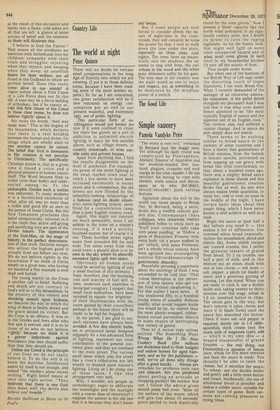Country Life
The world at night
Peter Quince
There will no doubt be certain, small compensations in the long. Age of Scarcity into which we are entering. (I put it in those definite terms, because I have been reading some of the more sombre experts.) So far as I am concerned, one great satisfaction will be if new restraints on energy consumption put an end to our present wasteful, and extremely ugly, use of public lighting.
This particular form of extrAvagance would not bother me now if it were confined to cities: but there has grown up a sort ol addiction to unlimited electric lighting in many far less suitable places, such as village streets, or country crossroads, or even out-, side pubs and private houses. Apart from anything else, I find the results disagreeable on the level of aesthetics. For example. the power of the street lighting in the small market town near to which I live seems to have been increased enormously in recent years; and in consequence, the old streets are now flooded by the unhealthy-looking outpourings of a hideous (and no doubt expensive) street-lighting system, more fitted for a concentration camp than aquiet English country town. Again, this might not concern me much personally, since I am seldom in the town on a winter's evening, if it were a strictly localised matter; but of course it is not. These horrible street lights make their presence felt far and wide. Ten miles away from this small town, a ghastly glow is to be seen in the sky where its absurdly excessive lights spill into space.
Obviously all human needs could be served by lighting of only a small fraction of this intensity. I hope, therefore, that the increasQs cost and scarcity of fuel will. ih time, moderate such exercises in municipal vainglory. I suspect that small local authorities, have been tempted to equate the brightnef, of their illuminations with tilt. lustre gained by their councillors; perhaps in the future there will be credit to be had for frugality.
In my parish, I am glad to say, such excesses have always been avoided. A few dim electric bulbs, set in antiquated lamps designed originally for a less advanced form of lighting, represent our total contribution to the general nocturnal glare; and they are confined to the main street. The various small lanes which join the street like a river's tributaries are left wholly to depend upon nature's lighting. Living as I do along one of these lanes, I like this arrangement very well.
Why. I wonder, are people so unthinkingly eager to obliterate the moonlight and the starlight with a coarse dose of electricity? I suppose the answer is the old one that it is because they don't know any better.
But if some people are now forced to consider afresh the nature of night-time in the countryside, they will certainly be none the poorer for that. I love to walk down the lane under the stars. especially on these clear, cold nights. The trees loom up majestically into the shadows, the air seems to sing with frost, the owl echoes in the wood and the white pony shimmers softly by his gate. The wise man in the country sees the night world as one to enjoy and respect, not as something to be destroyed by the mindless power of a switch.


























 Previous page
Previous page